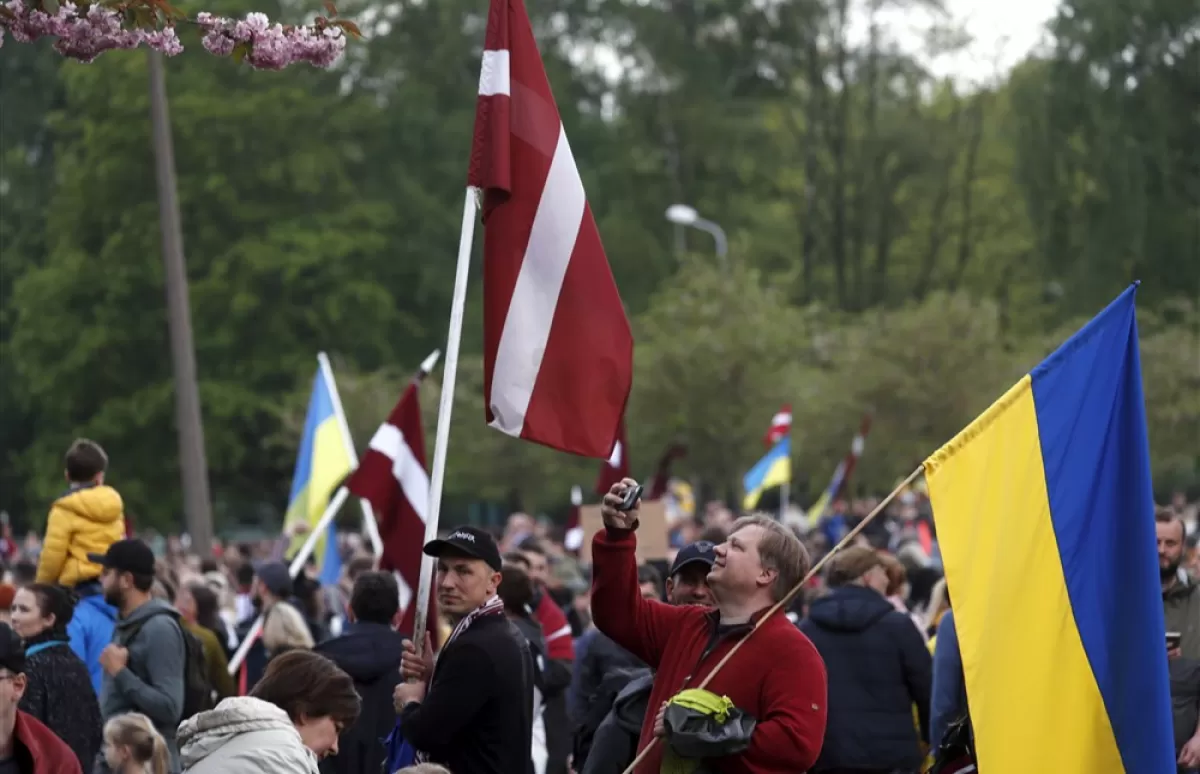
In late April, several international and Latvian media outlets quoted Kremlin documents about Russia’s plans in the Baltic countries. According to the journalists, Russia has drawn plans for each Baltic country on how to influence local politics and society. Each of these approaches had commonalities and differences and in each case, the Kremlin officials have determined the short-term, middle-term, and long-term aims. The war in Ukraine seems to have derailed these plans, but that doesn’t mean that Russia’s long-term goals have changed.
Undermining NATO and promoting the Russian language and the Soviet past
The documents were developed in two institutions monitored by Russian president Vladimir Putin and his administration. These two institutions are responsible for Kremlin’s activities in the Baltics. The main author of the plans was Vadim Smirnov who is on the „black list” of both Lithuania and Latvia due to espionage. He is known also as an author of Russian propaganda against Baltic countries. All the documents were made in the summer or autumn of 2021, before the full-scale Russian invasion of Ukraine.
Despite the fact that the Kremlin’s aims cover a large range of topics, one can separate several fields: Latvia’s relations with NATO, the official status of the Russian language in the country, including the educational system, and economic relations between Latvia and Russia.
According to the aforementioned articles, the Kremlin’s has several objectives for Latvia: 1) making sure there were no NATO bases; 2) getting a second, official language status for Russian; 3) an education system fully available in Russian, 4) the preservation of Soviet monuments; 5) the abolition of non-citizen status and turning Russian-speaking people automatically into Latvian citizens, thus giving them an opportunity to participate in elections while avoiding to learn the Latvian language.
The Kremlin has elaborated short-term plans for Latvia by determining that until 2022 the Kremlin has to resist the Baltic’s militarization or, in other words, avoid NATO forces in Latvia, to promote Russian goods on the Latvian market, and move the Russian cargoes from the Baltic ports to Russian ports and others. By the year 2025, Russia wants to prevent NATO from strengthening its position in the Baltics, cooperate with leaders who are friendly to Russia and are supported by both Latvians and Russians, open a school created and managed by Russia that will become the center of the strengthening of the Russian language, culture, and literature. And, finally, by 2030 Russia aims to find a favorable solution for the Kremlin regarding the status of non-citizens living in Latvia, to make the Russian language one of the official languages in Latvia, to achieve complete economic cooperation with Latvia, and that country’s participation in international organisations with Moscow.
Russia has similar – but not identical – objectives in Estonia and Lithuania. For instance, planned to strengthen its economic relations with Estonia in 2022, and foster, by 2025, a negative attitude to NATO with the help of influential pro-Russian voices in politics, culture, and business. The plan said that by 2030 Moscow would achieve a significant influence by means of Russian media and economic activities.
In Lithuania, Moscow was planning to secure her economic interests and prevent NATO presence by the year 2022, strengthen the Russian funds and NGOs operating in the country by 2025, and make the Lithuanian government acknowledge, by 2030, that NATO endangers the security of the country.
The director of Center of the Geopolitical Studies Riga Maris Andzans explains that it is logical that Russia has different approaches to each of the Baltic countries. For instance, in Lithuania there are not so many Russians as in Estonia and Latvia, thus the Russian language plays a smaller role.
„Nothing that is written there surprises me,” says Andzans. He even assumes that these plans could not be real and have been leaked on purpose. At the same time, it is always important to keep in mind that Russia has specialists in their intelligence services who have a good understanding of the Baltic countries. „Intelligent services have deep knowledge, tools, agents of influence,” explains Andzans, who notes that, aside from the intelligence community, Russia’s ministries of Foreign Affairs and Defense have their own plans. There also must be lists of people who must be neutralized in the case of an attack or some other operation against the Baltics. „I was waiting for something more: for real names and last names, for the numbers,” acknowledges Andzans, noting that Russia is very good at protecting their secrets.
Long-time researcher of Russian politics and foreign policy Andis Kudors emphasizes that the documents show how Moscow uses already well-known tools: media politics, Russian-language politics, and compatriot politics through which Russia tries to strengthen its influence in other countries by using Russians living there. „These tools have been used to influence minds and hearts in Baltics and other countries, particularly in those ones where people, and not only ethnic Russians, know the Russian language, as is the case in ex-Soviet republics,” explains Kudors. He does not exclude that these documents could be disinformation: „Part of the information could be true and part purposeful lies to influence our thinking”.
By attacking Ukraine, Russia has missed its Baltic goals, but that does not mean it is giving up on them
Regardless of whether these documents are leaked or not, they depict Russia's foreign policy and its failures. The war in Ukraine only made it harder for Moscow to achieve its goals, as the country has become increasingly isolated and less credible, or to make plans for the next few years regarding the staunchly pro-Ukrainian Baltic countries. At the same time, one must admit that Baltic countries are not the priorities for Moscow.
Ukraine, Moldova, Belarus, the former Soviet subjects in Central Asia, Armenia, and Georgia are more important for Russia. „These countries are easier targets. On the one hand, Russia wants to keep the Baltic countries under its wing, but, on the other hand, it understands that these are the most successful countries among the ex-Soviet republics,” explains Andzans. Also, the war in Ukraine has been counterproductive for Russia and the local population in Baltics is more unfavorable to Moscow than in other countries.
„We have never been a priority for Russia. We are useful to show to Europe that they [Europe] are hypocrites because in Estonia and Latvia Russians are oppressed [thus Europe has no right to blame Russia about the violence of human rights],” says Kudors.
Both experts note that, as an outcome of the Russian invasion of Ukraine, Russia achieved exactly the opposite of what it wanted according to the leaked documents: Latvia has refused Russian gas, the police and intelligence services have become less tolerant with the pro-Kremlin activities, and the country has completed transition to teaching in schools only in the Latvian language. Andis Kudors emphasizes the importance of the latter: “Language is not only the communication tool. In the hands of the Kremlin, it becomes a means of disinformation and propaganda (…) To think strategically means to think about [Russian-speaking in Latvia] children and youth, thus the question about the language in the schools is principled for the Latvian national security and society and it must happen around the Latvian language. There is no other way,” says Kudors.
He also points out Russia’s aim to persuade the Baltic, Northern, and Western European societies that NATO presence in the Baltics will worsen the state of the ecology in Baltic countries. Thus, there was a hope that under this pressure so-called Baltic militarization is not going to happen. But, instead of this, NATO’s presence in Baltics will become even stronger.
Simultaneously, it would be a mistake to underestimate Russia. It still can manage the war in Ukraine and it is not isolated from the rest of the world, acknowledges Andzans. South America, Africa, and India are quite indifferent to Russian foreign policies. “At that very moment when it starts to do something, we will be forced to react. Russia definitely has more detailed plans [on Baltic countries],” says Andzans.
Kudors emphasizes the importance to strengthen the position of the Latvian language in the public sphere since the Latvian language and culture are the basis of Latvia and it reduces the audience of Russian propaganda. Since the military threats to Baltics remain, Latvia must continue to develop military equipment and infrastructure. In this sense, Finland’s and Sweden’s accession to NATO (the latter still has to wait for a while) is extremely favorable for Latvia and Baltics. The capacity of intelligent services must also be developed for preventing the Russian influence on Baltic politicians. However, Russia will remain an unpredictable country.


